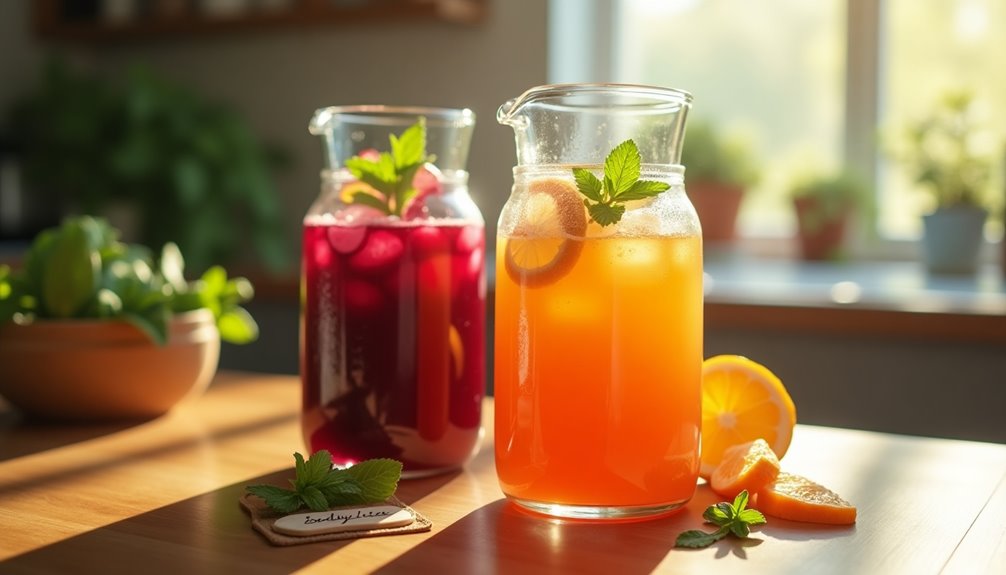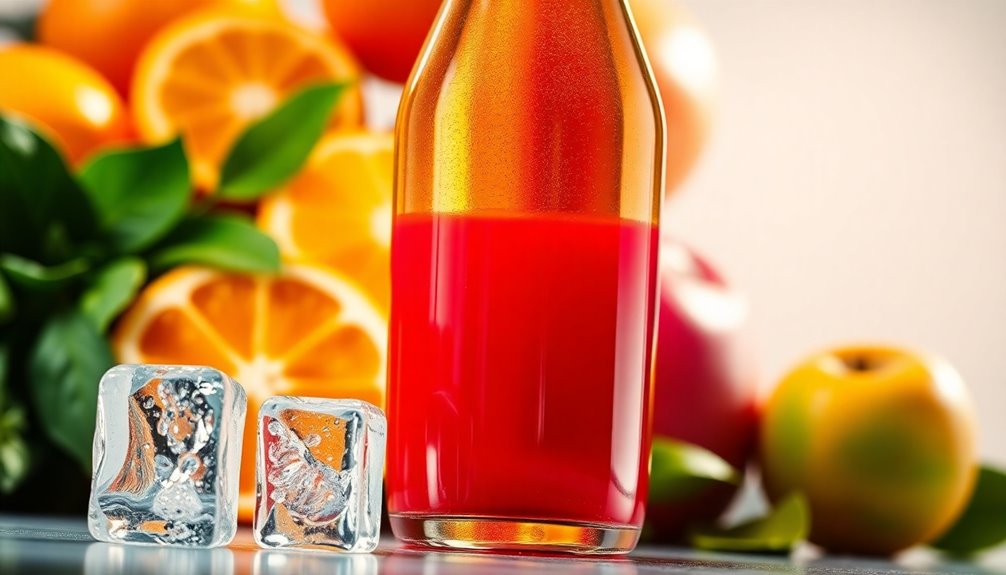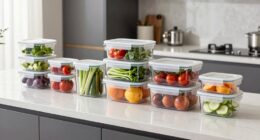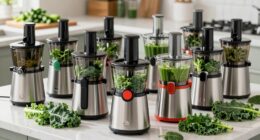You can store fresh juice for varying lengths depending on how it's made. If you use a centrifugal juicer, it lasts about 24 hours; with a masticating juicer, you can keep it for up to 48 hours. Vacuum sealing extends freshness to 5-7 days, while cold-pressed juice stays fresh for 3 days. For long-term storage, freezing juice can preserve it for 12 to 16 months. Want to know the best practices for maximizing freshness?
Key Takeaways
- Fresh juice from a centrifugal juicer is best consumed within 24 hours for optimal flavor and nutrients.
- Juice from a masticating juicer can last up to 48 hours while retaining quality.
- Cold-pressed juice should be consumed within 3 days to maintain its freshness.
- Vacuum sealing can extend the shelf life of juice to 5-7 days.
- Freezing juice allows storage for 12-16 months with minimal nutrient loss if properly sealed.

How long can you really store fresh juice without losing its flavor and nutrients? When you juice, you want to enjoy that burst of freshness, but it's just as important to know how to store juice properly to maintain its quality.
Fresh juice made from a centrifugal juicer typically lasts up to 24 hours, while if you use a masticating juicer, you can keep it fresh for up to 48 hours. However, if you're serious about maximizing the shelf life of your juice, you might want to consider vacuum sealing it. When you vacuum seal your juice, it can stay fresh in the fridge for an impressive 5 to 7 days. That's a significant improvement over traditional storage methods.
Cold-pressed juice, which utilizes slow extraction techniques, can also be a great option. It can be stored in the refrigerator for up to 3 days, which helps you retain much of its taste and nutrients.
Still, for optimal freshness, it's generally recommended to consume fresh juice within 72 hours after juicing. As soon as your juice is exposed to air, nutrient degradation begins to accelerate, which is why timely consumption can make a big difference in your experience.
If you find yourself with more juice than you can drink within a few days, don't worry—you can always freeze your juice! Freezing allows you to enjoy your homemade creations months later. When done correctly, frozen juice can last for 12 to 16 months with minimal nutrient loss, provided it's properly sealed.
Just remember to portion it out in small containers to make thawing easy and to avoid waste.
If you're on the hunt for the best juicer for extending the life of your juice, a masticating juicer comes highly recommended. This type of juicer extracts juice more slowly and gently, resulting in a higher yield and less oxidation, which means your juice will stay fresher longer. The initial investment can be worthwhile if you value fresh juice and its nutritional benefits.
Ultimately, it's a balance between enjoying fresh juice and managing how long you store it. Aim to drink your juice within the first couple of days for the best experience, and consider vacuum sealing if you need a few extra days.
If you can't finish it all, freeze your juice to preserve its flavor and nutrients for a later date. By following these simple guidelines, you can enjoy fresh juice to its fullest while minimizing waste.
Frequently Asked Questions
How Long Do Fresh Juices Last in the Fridge?
Fresh juices vary in how long they last in the fridge.
Generally, citrus juices like orange juice stay good for 2-3 days, while tropical juices, such as pineapple, can last 4-5 days.
If you've used a cold-pressed juicer, expect freshness for about 72 hours.
For the best results, store your juices in airtight glass containers and keep them at a consistent temperature between 35-40°F (1.6-4.4°C) to maximize their longevity.
How Long Can Freshly Squeezed Juice Last in a Mason Jar?
Freshly squeezed juice can last up to 72 hours in a mason jar when it's properly sealed and kept at the right temperature.
To keep it fresh, fill the jar to the top to minimize air exposure, which reduces oxidation. If you use an airtight lid, you can extend its life even further.
For longer storage, consider vacuum-sealing the jar, allowing the juice to stay fresh for about 5-7 days in the fridge.
Can You Drink Juice After 7 Days?
Imagine sipping on a vibrant glass of fresh juice, bursting with life.
But can you really drink juice after 7 days? It's a gamble you don't want to take.
After a week, the juice could turn sour, both in taste and safety. Bacterial growth might sneak in, and you could end up with more than just a bad flavor.
Trust your senses—if it smells off or tastes strange, it's best to toss it.
How Long Are Squeezed Juices Good For?
Squeezed juices are typically good for 2-5 days, depending on the type of fruit and your storage methods.
Citrus juices last around 2-3 days, while pineapples or lemons can hang around for up to 4-5 days.
If you use a masticating juicer, expect a shorter shelf life than with a twin gear juicer, which offers better oxidation protection.
Always store your juice in airtight glass containers in the fridge to maximize freshness.
Conclusion
In conclusion, fresh juice is best enjoyed soon after it's made, but you can store it in the fridge for up to 72 hours if you seal it tightly. Remember, "the early bird catches the worm"—the sooner you drink it, the more nutrients and flavor you'll savor. So, whip up your favorite juice, store it smartly, and enjoy every delicious sip while it's at its freshest! Cheers to your health!
Cindy thoroughly researches juicing trends, techniques, and recipes to provide readers with practical advice and inspiration. Her writing style is accessible, engaging, and designed to make complex concepts easy to understand. Cindy’s dedication to promoting the advantages of juicing shines through her work, empowering readers to make positive changes in their lives through the simple act of juicing.











